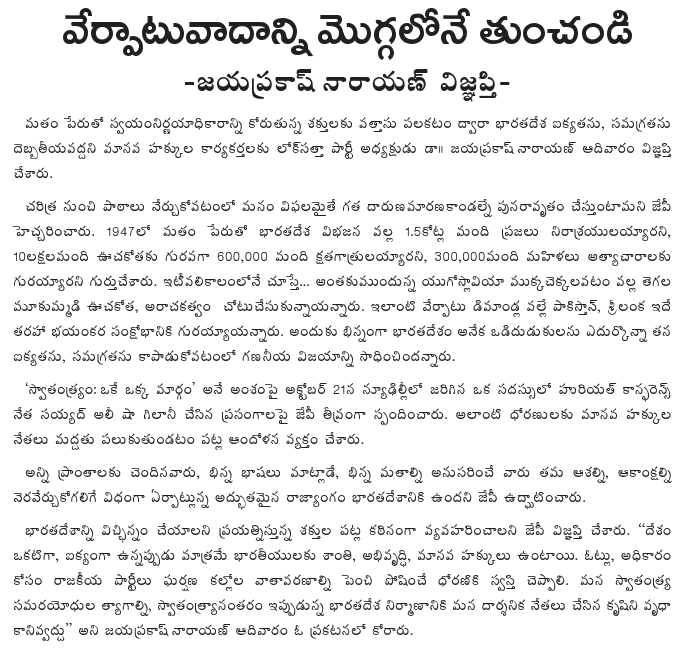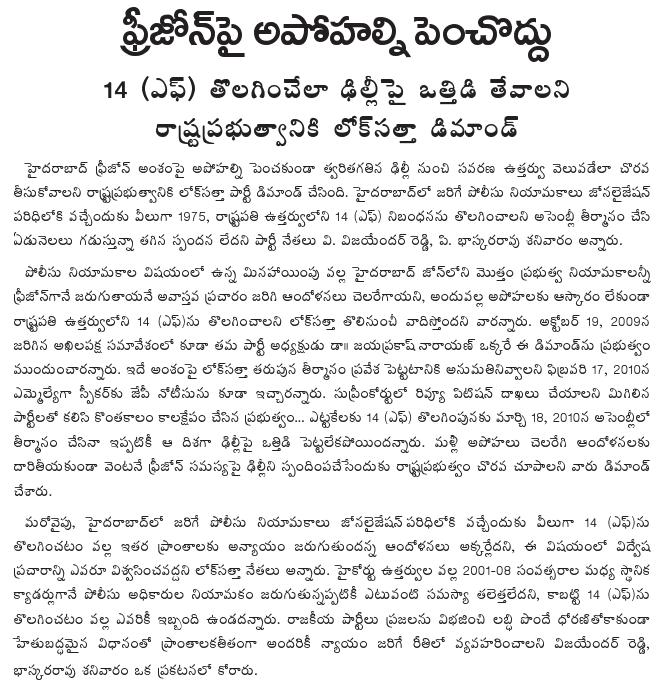Press Releases Archive
Nip secessionist talk in bud: Dr. JP
Lok Satta Party President Dr. Jayaprakash Narayan today appealed to human rights activists not to endanger the unity and integrity of India by lending legitimacy to forces seeking self-determination in the name of religion.
Paraphrasing George Santayana, Dr. JP said that if we fail to learn from history, we are doomed to repeat it. He recalled that the Partition of India in the name of religion in 1947 saw 15 million people being uprooted from their homes, a million butchered, 600000 maimed and 300000 women molested. In the recent past, balkanization of the erstwhile Yugoslavia resulted in genocide and anarchy. Pakistan and Sri Lanka had gone through similar strife following secessionist demands. In contrast, India despite many hiccups has remarkably succeeded in preserving its unity and integrity.
Dr. JP was reacting to the speeches made at a seminar titled ‘Azadi: The Only Way’ in New Delhi on October 21 by Hurriyat Conference leader Syed Ali Shah Geelani and others.
Dr. JP pointed out that India has a marvelous Constitution, which can accommodate the hopes and aspirations of people belonging to all regions, speaking diverse languages and professing different religions.
Dr. JP wanted both the Union and State Governments to act firmly against forces that are out to dismember India by. “Indians can have peace, prosperity, and human rights only when the country remains one and united. Political parties should not fish in troubled waters in their quest for power and votes. Let not the sacrifices made by freedom fighters and efforts put in by visionary leaders post-Independence in building India of today go in vain.”
Seven Great Scourges Hurting India
The central challenges of our polity are the failure of the best and brightest to enter public life and make the necessary sacrifice to accept the burdens of leadership; and the highly centralized governance system which distanced people from the elected leaders and civil servants. The rest are all consequences of these twin failures.
As a result, seven great scourges are hurting the country:
1.Perpetuation of abject poverty despite resources and technology
2.All-pervasive corruption
3.Over-centralization
4.Failure of rule law and the rise of anarchy and criminalization
5.Politics of division, hatred and primordial loyalties
6.Increasing urban-rural divide, and excessive migration to big cities
7.Rise of licentious behaviour, and abuse of alcohol and drugs
Happily, India has also done a few things right in the past sixty years. Strengthening of federalism, a sound institutional infrastructure, preserving freedoms, and rapid economic growth in recent years after decades of stagnation of the license raj are our greatest successes.
We need to focus on a few key changes to preserve our strengths and overcome weaknesses.
Judicial reforms: The recent events showed us how vital it is to preserve the credibility, independence and integrity of the judiciary. We need to create a mechanism for appointments for higher judiciary; and for removal of errant judges. We also need to encourage entry of our best and brightest young men and women into judiciary at lower levels.
Corruption: A strong, effective, independent anti-corruption commission with powers to confiscate property, and ensure swift punishment is the need of the hour. The stink of Commonwealth Games, the many recent scams and allegations, and the obvious rise in corruption everywhere make this an opportune time to fight corruption – in politics, bureaucracy and judiciary.
Decentralization: The recent draft amendment of the Constitution proposed by the Union government is a good starting point. There is broad acceptance in principle, and we must work for its enactment so that the people are empowered, vote is seen by citizens as a valuable tool; there is visible link between taxes and services; and authority fuses with accountability.
Liberalization of agriculture and rural rejuvenation: Agriculture is still suffering under the yoke of the mighty bureaucracy, and license-permit-raj continues in this sector. Consequently, price signals are not allowed to influence production; free trade is not permitted, and farmers are made abjectly dependent on government largesse. A free trade regime in agriculture with adequate safeguards to ensure food security, and protection of farmers from imports will liberate rural economy and transform the lives of 55% Indians.
Political reform: We need to eliminate the role of marginal vote which is at the root of criminalization, vote buying, and electoral fraud. Proportional system of representation with suitable safeguards to suit our conditions; and direct election of the executive at local and state levels will largely eliminate the distortions by creating a new set of incentives, and destroying the existing ones.
Rule of law: Independent crime investigation, independent prosecution, strengthening forensic capabilities, faster legal procedures, greater number of courts, and speedy justice will transform the way society looks at the law and state. Once rule of law makes it easy for people to do good, and makes it difficult to do evil, a lot of things change dramatically.
I believe these changes are round the corner if we all focus our energies and understand the levers of change. Yes, things are bad – at times unbearably bad. But as they say, when we are going through hell, we should keep going. There is light at the end of the tunnel.The demographic changes in India, rapid economic growth and rising incomes, the exposure to satellite television, and access to modern technology make the next decade the decade of transformation.
Let us keep our morale high, and collectively and systematically address the challenges step by step. We will surely achieve most of these six goals by 2020.
Lok Satta demands deletion of controversial section
The Lok Satta Party today asked the State Government to ensure that Section 14 (f) of the Presidential Order, 1975 is deleted as unanimously sought by the Andhra Pradesh Assembly on March 18, 2010. Deletion of the section will bring appointment of police personnel up to a certain cadre under the zonalization scheme introduced through the 32nd Constitution Amendment Act of 1975.
In a media statement, Lok Satta Party leaders V. Vijayender Reddy and P. Bhaskara Rao recalled that party President Dr. Jayaprakash Narayan had suggested deletion of the section in the all-party meet convened by the Chief Minister on October 19, 2009. He had even written to the Speaker of the Assembly on February 17, 2010 seeking permission to introduce a resolution to that effect. The Government dropped its plans to file a review petition in the Supreme Court and finally introduced the resolution in the Assembly. It has, however, failed to get it implemented by New Delhi.
The Lok Satta leaders pointed out that deletion of the controversial section will clear misgivings among people and ward off agitations on recruitment to Government services. They appealed to people not to be misled by propaganda that the deletion of the section will harm the interests of job aspirants of other regions.


